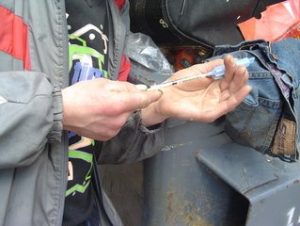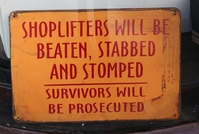 Last week, Kane County State’s Attorney, Joe McMahon, reported that Kane County Prosecutors have seen a rise in the number of criminal cases filed in Kane County in the first six months of this year compared to last year. McMahon reports that felony filings are up 15.7% compared to the same period last year. The increase in criminal cases in Kane County is happening with misdemeanor and traffic cases as well. In the first six months of 2017, 1,247 new felony cases were filed. During the same period last year, 1,078 cases were filed. Aurora, the largest city in Kane County, has seen a drop in the number of new felony cases. Most criminal cases in Kane County come from Aurora. The Village of Carpentersville has seen a rise in the number of Retail Theft cases. Carpentersville police attribute this to the opening of a new Walmart in Carpentersville. Elgin, the second largest city in Kane County, has seen a rise in violent crimes. McMahon is concerned with the increase in the number of criminal cases filed in Kane County since the number of criminal cases filed increased in 2016 as well.
Last week, Kane County State’s Attorney, Joe McMahon, reported that Kane County Prosecutors have seen a rise in the number of criminal cases filed in Kane County in the first six months of this year compared to last year. McMahon reports that felony filings are up 15.7% compared to the same period last year. The increase in criminal cases in Kane County is happening with misdemeanor and traffic cases as well. In the first six months of 2017, 1,247 new felony cases were filed. During the same period last year, 1,078 cases were filed. Aurora, the largest city in Kane County, has seen a drop in the number of new felony cases. Most criminal cases in Kane County come from Aurora. The Village of Carpentersville has seen a rise in the number of Retail Theft cases. Carpentersville police attribute this to the opening of a new Walmart in Carpentersville. Elgin, the second largest city in Kane County, has seen a rise in violent crimes. McMahon is concerned with the increase in the number of criminal cases filed in Kane County since the number of criminal cases filed increased in 2016 as well.
In 2016, McMahon talked about the inability of authorities to make a dent in the number of Domestic Battery, or Domestic Violence cases filed in Kane County. In 2016, McMahon reported that of the almost 5,700 misdemeanor cases filed in Kane County in 2015, 1,219 involved Domestic Battery, or Domestic Violence charges. 200 Aggravated Domestic Battery felony charges were filed in Kane County in 2015. In the same 2016 discussion, McMahon talked about the impact that the heroin problem is having on Kane County. McMahon echoed his concerns about the heroin problem in Kane County last week when he announced an increase in the number of criminal cases filed in Kane County. Last week, McMahon stated that drug-related cases, “continue to be a serious problem.”
This morning, the Chicago Tribune is reporting about efforts that police departments throughout the State of Illinois are taking in an attempt to get drug users into drug treatment. Many local police agencies are trying to implement a program started by the police in Glocester Massachusetts a few years ago. The programs are commonly referred to as “Safe Passage.” If people walk into a police station and give up their drugs and ask for help, instead of placing them under arrest, the police will dispose of the drugs without filing criminal charges and will place them in drug rehab programs. More and more police agencies in Illinois are trying to do something like this with varying results. Authorities in Dixon Illinois report great success with their program. Dixon police report that 170 people have been placed into rehab with this program. More than half of the people placed in drug rehab have successfully completed their drug treatment. Dixon police report a 39% decrease in the number of misdemeanor and felony criminal cases filed.
 I often receive phone calls from clients asking me if they can go back home after they are released from jail or whether they can contact their boyfriend or girlfriend or spouse after being released from jail. I usually tell those clients to come to my office and bring all of the papers that were given to them when they were released from jail. It is very important to keep all of your papers with you if you are arrested and released by the Police so that you may appear for court. You should bring all of your paperwork with you when you are meeting with your lawyer.
I often receive phone calls from clients asking me if they can go back home after they are released from jail or whether they can contact their boyfriend or girlfriend or spouse after being released from jail. I usually tell those clients to come to my office and bring all of the papers that were given to them when they were released from jail. It is very important to keep all of your papers with you if you are arrested and released by the Police so that you may appear for court. You should bring all of your paperwork with you when you are meeting with your lawyer. Chicago Criminal Lawyer Blog
Chicago Criminal Lawyer Blog


 In criminal cases, it is common for the prosecution to seek to admit into evidence things that were seized by the police as a result of the search of a residence. One of the first things that a criminal defense attorney does in a criminal case involving the search of a house is to determine whether the evidence seized by the police can be admitted in court.
In criminal cases, it is common for the prosecution to seek to admit into evidence things that were seized by the police as a result of the search of a residence. One of the first things that a criminal defense attorney does in a criminal case involving the search of a house is to determine whether the evidence seized by the police can be admitted in court. This morning I spoke to a client who made it out of a local store last night after shoplifting a couple of items without getting caught. The client wanted to know whether they could still be arrested for shoplifting and charged with a Retail Theft even though they were not caught inside the store. The client wanted to know how long they had to arrest him and charged him with a Retail Theft and what they should do if they were contacted by the police.
This morning I spoke to a client who made it out of a local store last night after shoplifting a couple of items without getting caught. The client wanted to know whether they could still be arrested for shoplifting and charged with a Retail Theft even though they were not caught inside the store. The client wanted to know how long they had to arrest him and charged him with a Retail Theft and what they should do if they were contacted by the police. A common question I get from clients is whether they will have to go to jail if they are arrested by the police. Yesterday, I received a telephone call from a prospective client who was caught shoplifting at a local Target. When he was approached by store security, he ran out of the store and jumped into his vehicle and left the store. He noticed the security guards chase him to his car and realized that they probably had his license plate number. The next day he spoke to a police officer who told him that they they have him on video committing the crime and leaving the store and would be charging him with a Retail Theft. He wanted to know whether he would go to jail if he turned himself in as the police had asked him to. This is a common question I get from people calling me and asking for my advice. Many people do not realize what happens when they are arrested and what their rights are when they are in the custody of the police and are not free to leave.
A common question I get from clients is whether they will have to go to jail if they are arrested by the police. Yesterday, I received a telephone call from a prospective client who was caught shoplifting at a local Target. When he was approached by store security, he ran out of the store and jumped into his vehicle and left the store. He noticed the security guards chase him to his car and realized that they probably had his license plate number. The next day he spoke to a police officer who told him that they they have him on video committing the crime and leaving the store and would be charging him with a Retail Theft. He wanted to know whether he would go to jail if he turned himself in as the police had asked him to. This is a common question I get from people calling me and asking for my advice. Many people do not realize what happens when they are arrested and what their rights are when they are in the custody of the police and are not free to leave. I recently met with a client whose son had been questioned by the police at the police station and charged with a Retail Theft. The client was complaining that the police questioned her son at the police station without providing a lawyer for him and without allowing her to be present with her son. She wanted to know whether the police could question her son without her being present. Here’s what I told her:
I recently met with a client whose son had been questioned by the police at the police station and charged with a Retail Theft. The client was complaining that the police questioned her son at the police station without providing a lawyer for him and without allowing her to be present with her son. She wanted to know whether the police could question her son without her being present. Here’s what I told her: Everybody knows that if you are arrested and charged with a Retail Theft, or Shoplifting, you will be facing serious criminal penalties that could have serious implications for your future. How many people are surprised to find out that in addition to the criminal implications of a Retail Theft, they will probably soon be facing a potential Civil Penalty. This part of a Retail Theft arrest is not well understood by clients. Many clients mistakenly believe that what happens in one aspect of a Retail Theft case will affect the other aspect of the Retail Theft case. In other words, many people believe that if they just pay the Civil Penalty then the criminal case will be dismissed. This is not how things work and people need to understand what the Civil Penalty is and how it relates to a Retail Theft.
Everybody knows that if you are arrested and charged with a Retail Theft, or Shoplifting, you will be facing serious criminal penalties that could have serious implications for your future. How many people are surprised to find out that in addition to the criminal implications of a Retail Theft, they will probably soon be facing a potential Civil Penalty. This part of a Retail Theft arrest is not well understood by clients. Many clients mistakenly believe that what happens in one aspect of a Retail Theft case will affect the other aspect of the Retail Theft case. In other words, many people believe that if they just pay the Civil Penalty then the criminal case will be dismissed. This is not how things work and people need to understand what the Civil Penalty is and how it relates to a Retail Theft. This is one of the most common questions I get asked by people that have been arrested and charged with a Retail Theft. When I get asked that question, that’s when I start asking questions. Because whether or not they committed a Retail Theft depends on the specific facts of their case. Most of the time they tell me that they forgot to pay for an item that they had mistakenly placed in their purse or in a bag. Some people tell me that their child took an item and hid it from them without them knowing. Other people tell me they tried on a piece of jewelry and forgot to take it off. Whatever the explanation is, many of them tell me that they don’t understand how they could be charged with stealing something from a store if they did not physically leave the store when they were stopped by security.
This is one of the most common questions I get asked by people that have been arrested and charged with a Retail Theft. When I get asked that question, that’s when I start asking questions. Because whether or not they committed a Retail Theft depends on the specific facts of their case. Most of the time they tell me that they forgot to pay for an item that they had mistakenly placed in their purse or in a bag. Some people tell me that their child took an item and hid it from them without them knowing. Other people tell me they tried on a piece of jewelry and forgot to take it off. Whatever the explanation is, many of them tell me that they don’t understand how they could be charged with stealing something from a store if they did not physically leave the store when they were stopped by security. Clients that are charged with Retail Theft frequently call me a few weeks after they are arrested and tell me that they received a letter from the store’s lawyers demanding money. Sometimes, they receive this letter even if they haven’t been criminally charged for the Shoplifting. They usually have two questions when they receive that letter. The first question is whether this means that if they pay the amount they are asking for will that mean that their case is dismissed? The second question is whether they have to pay the amount they are demanding. I will explain to you what I tell them and what that letter means.
Clients that are charged with Retail Theft frequently call me a few weeks after they are arrested and tell me that they received a letter from the store’s lawyers demanding money. Sometimes, they receive this letter even if they haven’t been criminally charged for the Shoplifting. They usually have two questions when they receive that letter. The first question is whether this means that if they pay the amount they are asking for will that mean that their case is dismissed? The second question is whether they have to pay the amount they are demanding. I will explain to you what I tell them and what that letter means. Last week, Kane County State’s Attorney, Joe McMahon, reported that Kane County Prosecutors have seen a rise in the number of criminal cases filed in Kane County in the first six months of this year compared to last year. McMahon reports that felony filings are up 15.7% compared to the same period last year. The increase in criminal cases in Kane County is happening with misdemeanor and traffic cases as well. In the first six months of 2017, 1,247 new felony cases were filed. During the same period last year, 1,078 cases were filed. Aurora, the largest city in Kane County, has seen a drop in the number of new felony cases. Most criminal cases in Kane County come from Aurora. The Village of Carpentersville has seen a rise in the number of Retail Theft cases. Carpentersville police attribute this to the opening of a new Walmart in Carpentersville. Elgin, the second largest city in Kane County, has seen a rise in violent crimes. McMahon is concerned with the increase in the number of criminal cases filed in Kane County since the number of criminal cases filed increased in 2016 as well.
Last week, Kane County State’s Attorney, Joe McMahon, reported that Kane County Prosecutors have seen a rise in the number of criminal cases filed in Kane County in the first six months of this year compared to last year. McMahon reports that felony filings are up 15.7% compared to the same period last year. The increase in criminal cases in Kane County is happening with misdemeanor and traffic cases as well. In the first six months of 2017, 1,247 new felony cases were filed. During the same period last year, 1,078 cases were filed. Aurora, the largest city in Kane County, has seen a drop in the number of new felony cases. Most criminal cases in Kane County come from Aurora. The Village of Carpentersville has seen a rise in the number of Retail Theft cases. Carpentersville police attribute this to the opening of a new Walmart in Carpentersville. Elgin, the second largest city in Kane County, has seen a rise in violent crimes. McMahon is concerned with the increase in the number of criminal cases filed in Kane County since the number of criminal cases filed increased in 2016 as well. This is one of the more common questions that I get asked when people call me wanting advice about how to deal with a situation like this. Many people think that as long as it’s not the police asking questions, they have nothing to worry about. Nothing can be further from the truth. If your employer is suspecting that you stole something and they want you to come in to the office to discuss the matter, you need to be aware of how dangerous this situation can be. This situation can be more dangerous than talking to the police. Let me explain why.
This is one of the more common questions that I get asked when people call me wanting advice about how to deal with a situation like this. Many people think that as long as it’s not the police asking questions, they have nothing to worry about. Nothing can be further from the truth. If your employer is suspecting that you stole something and they want you to come in to the office to discuss the matter, you need to be aware of how dangerous this situation can be. This situation can be more dangerous than talking to the police. Let me explain why.